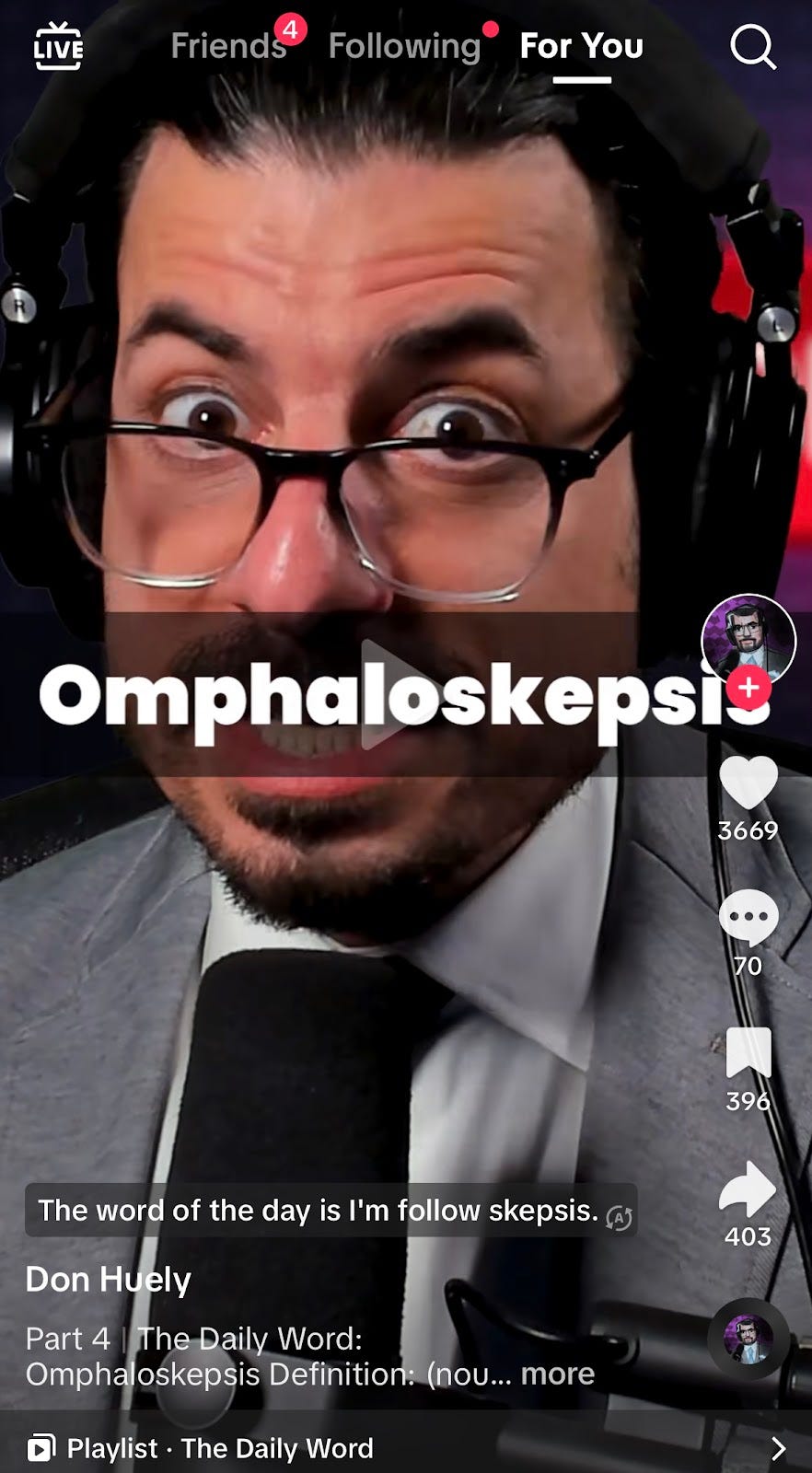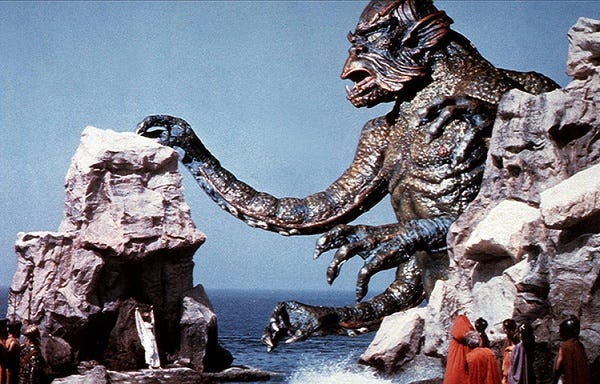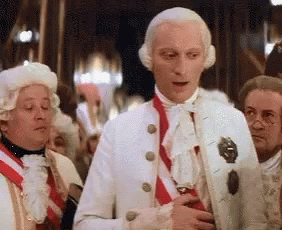Omphaloskepsis
a vocab word that happens to be one of my favorite obnoxiously fancy things to utter. Besides ‘utter.’
AUTHOR’S NOTE ABOUT THIS RE-POSTING: I wrote this piece on Omphaloskepsis a while back and I feel like it’s the perfect time to revisit these concepts. Plus, the vocab word I’m composing right now is becoming rather involved and complex, so. Here’s a little ranty navel-gazing for you to enjoy, or to enjoy again if you’ve been following me for a while. I haven’t edited or updated it since its initial posting, fyi—I feel like it still stands as is. So, enjoy! And stay tuned next week for a fresh new shiny vocab word.

Here’s the full TikTok, if you’d like to watch it beyond just this screencap.
The Omphalic Oyster Boy
I was a little late to the event—I had been out for snacks and beer which was my dinner, between intensive classes and the required faculty reading in the evening. The Summer Writing Program at Naropa University was famously rigorous, and the ‘syllabus’ of necessary attendance for the MFA students even more so than others. I was late to many things that summer; not late enough for it to be a problem, but it did add a healthy dose of scrambling panic to the pitchers and the poetry.
So the only seats left at the reading were in the back row. I found my way to a seat next to celebrated poet [NAME REDACTED] and fished for my notebook. He nodded at me, and offered the red Solo cup he held. “Would you like some?” he asked.
“Oh,” I replied, still a little breathless from my downtown-to-campus jog, “thanks anyway—I just had a bunch of beer.”
“This is not beer,” [REDACTED] commented, still holding the red cup out in offering.
“Oh?” I inquired, and took the cup. I gave it a sniff. It was definitely whiskey, also definitely nothing nicer than Jameson, though maybe it wasn’t even that. Maybe Jack? I looked at the famous male poet sitting in house-lit shadow, looked at his cup of hand-warmed whiskey, neat, in its plastic cup, shrugged, and took a swig.
[REDACTED] was last in the faculty lineup that night, and so for the rest of the event, we sipped from the cup and quipped about the poets that were reading ahead of him. At the penultimate poet’s performance, he bemoaned the fact that they’d put another poet with a thick accent on right before him (he, too, had an accent). He said it was a bad programming idea, going so far as to call it “torture” for the audience.
Years later, I was teaching an online writing course at DU called ‘Writers on Writing’. This was in the early aughts, in the fledgling days of online learning, and the class was not only a writing workshop for the program’s Masters students in creative writing, but was also a sort of platform for getting tips for living the writer’s life. For the core few weeks of the class, established authors would appear (virtually) and join discussion boards about their work as well as give very brief feedback on the work of the student writers. It was up to the professor teaching the course to find a roster of ‘real’ authors to make their guest appearances. This was back in the days when we teachers of the course also got to design the course itself. I was very good at this, and even won an award for my course design a couple years later. The guest author lectures, though, of course, would not be paid for by the school. Each guest author would have to agree to do it gratis, or the instructor would pay them out of their own pocket. Or, as was the case for a few of the authors I managed to rustle, they’d ask that their most recent book be a required purchase for the class, in lieu of compensation. Which I was happy to do.
That year (early aughts still) I was hard pressed to find enough authors to fill the 4 or 5 weeks I needed to for the course, when I remembered [POET NAME REDACTED] and our Naropa whiskey reading experience not that many years ago. I emailed him inquiring if he’d like to pop on over to the class site and bestow his wisdom (if not his whiskey, because online) unto my students for a week. I wrote something about how I didn’t know if he remembered me, and I can’t for the life of me remember how I incorporated this awesome vocab word, but I definitely said something about contemplation and omphaloskepsis. Maybe it was a reference to the ‘contemplative education’ aspect of Naropa? I don’t recall. What I do recall was his answer, mainly because it was so strange that I kept it, printed out, over the years:
Jenn Zuko: the visual is everything and it’s good advice for a young writer. The young writer lowers herself into a tub half full of oysters. The omphalic Oyster Boy holds the laptop above her belly so that she can can lay her pallid fingers on the keyboard.
Alternative: the omphalic Oyster Boy types as she dictates.
He agreed to (virtually) come to my class, in exchange for every student buying his latest poetry collection. In case that wasn’t apparent from the above response.
Bad Men, Good Poets
Power structure based sexuality in university interactions was absolutely normal when I was in grad school. Certainly it was before that, in the ‘90s, when I went to 3rd-place-on-the-party-school list, CU-Boulder. I don’t think that sitch has changed very much either, though our current culture has come to tolerate such manipulative abuses slightly less. It’s less overtly allowed, but how many sexual assaults on campus go without investigation, let alone consequences for the perpetrators?
Most of my specific examples from my own personal circle’s experience is from Naropa, but let’s be clear: this was only one place out of very many that patronized unbalanced sexual dynamics—it’s the normality of the young student and the older professor taking advantage of them. This wasn’t done shamefully under cover of secrecy or fear of legal action, back then; much of this bad behavior was overt, and in some examples, administration-sanctioned.
For example: at each Naropa summer intensive, the top graduate students would be assigned to be assistants to the (often celebrity) guest professors. I wanted to be one particular visiting professor’s assistant, very badly, as I loved especially his research work and had lots of questions about it. The administration refused my request, for the reason that that professor liked boys, so they put a dewy young man in as his assistant instead of me. No, really—the department authorities told me this was the reason, point-blank. My interest in this professor was for his work and his research. I can only assume the beautiful boy who they put into his close company also felt that way, but I don’t know. I know the boy wasn’t as big a fan of the guest prof’s work as I was. I don’t know what, if anything, happened that summer, to him. I don’t want to. I hope nothing.
This was normal, though! If I had complained, I would have been laughed at. In fact, we were taught (trained, groomed?) as we grew up through school to think that such inappropriate attention was a good thing. It means he thinks you’re special—after all, without such, you won’t get far. Quit being difficult: you should be thankful.
There’s another poet from a good while earlier than this, a venerated and well known voice of the time of the neo-Beats, one of the founding members of the institute and the writing department where I attended. He was (and still is, as far as I know) known as the ‘Sacred ghost of Naropa’ and can I tell you how tired I am of everyone (especially Neuropans) celebrating him as an icon and activist poet, when he literally abused young men withal. This was the ‘70s, though. And all the books and all the bios, official and un-, don’t really talk about this facet of his legacy. Not really. They treat it with kid gloves: the legacy of abuse he left in his wake.
Before you ask: there’s no proof of his actions, as none of the survivors ever spoke up to police or to the public. However, my partner and I grew up in and near that scene in Boulder—we were close enough to all of this as teens that we know people who were abused by this celebrated man. Everyone around the school and around him in general knew it was happening; it was one of those open secrets that people just rolled their eyes at or chuckled about. It was just a normal thing that was common and even cultivated by the institute. I’m not willing to do the research and out any survivors without consent, so that’ll have to remain that. But you see my point. I won’t even bother naming him. I don’t think I need to.
Why was this okay? Because the perpetrator was a good poet? Because he was famous? Because none of the survivors ever came forward? Because he’s dead now? Fuck that and fuck him. Also? He’s not that good. Nobody’s art can ever be said to be ‘worth’ the victimizing of human beings, however excellent it may be.
My experience with [REDACTED] in the audience with the Solo cup whiskey was nothing actually creepy, though—it was a nice time and a respectful and a fun, and at no point did I feel taken advantage of and of course I wasn’t roofied nor assaulted. I didn’t feel weird and subject to the power dynamic; on the contrary, it was a jovial, companionable time in my mind and my experience. But I’m sure hearing that story today in 2023 may have rubbed you wrong. Right? That’s because it should. It’s inappropriate, at least it would be today.
Then again, I was a highly functional and very experienced drinker at that point in my life, and (to be more fair to everyone involved, because this was literally the case): drinking together was THE way anyone got to know each other back then; the way you met people and formed friend groups. Drinking with this man actually wasn’t really that odd—this was the center of any networking at that time, for all of us. Many Gen X people you’ll meet either are or were alcoholics, because of this very thing. We had to learn how to drink in order to function at all socially. That this is no longer necessary is great, but we are not used to it.
Fame & Shame
The stereotype of the scruffy older professor (usually of the humanities, especially English or Literature) schtupping his young (usually women) students is still a pervasive one. Movies like The Gambler among so very very many more give forth this story, as do many forms of popular and other literature. It’s almost a genre of its own, more than a trope. Thing is, this trope isn’t only that—it happens in real life all the time. I happen to know this happened a few times at my undergrad school as well as the above tales of grad school (of course it happened everywhere there; it’s a huge university) but I mean in my own departments. There are laws in place throughout higher ed, to prevent this widespread predation, that don’t really do so. But at least now it’s a crime. Technically.
Robert Reich wrote an interesting post here on Substack recently on the lost concepts of “Honor & Shame”: his thesis is basically that we need to reinstitute what both of these things really mean, and put them into practice in especially political interactions before our democracy goes where the woodbine twineth. Are instilling consequences the missing key here? Can it be that simple? It seems to me like most of these men just issue a halfhearted apology (if that) and continue on their merry way, at least in pop culture, and in academic circles the norm is still largely silence. Not always, but enough times that it doesn’t seem like the power of #metoo is really doing much anymore. Especially in academia—abuse is rampant, and often there are no investigations even, let alone consequences, on campus. There isn’t much of it anywhere, as much as some people like to complain about cancel culture.
Don’t get me wrong: I’m not one to erase an entire (especially genius) body of work because a person is a flawed human being. What I am quite, quite sick of, though, is forgiving and even forgetting violent and coercive abuse because a man happens to be a great artist. Young people were literally fed to these monsters at Naropa, and they’re chained to that rock as an offering for the Kraken even still, across the academic landscape.
It’s not worth it. No art, however gorgeous or well executed, is worth that.
Hey, buddy, my navel is up here.
Oh, the definition of omphaloskepsis? It means, quite simply, ‘navel-gazing,’ and holy wow look what cultural commentary comes out of me when prompted by gazing at my own navel. Actually, now that I look again at it, I did a lot more skepsis of other people’s omphalos in this piece, didn’t I. Well. There it is.
Anyway. How about a conclusion: Can we stop celebrating predators because they’re talented? Can we please quit giving them excuses for their (beyond) bad behavior? More: can we maybe celebrate the brilliant artists who aren’t rapists? Who are maybe imperfect humans but are not predators, using their exalted position and art to better humanity, not to (literally) fuck people over? Can we find those men who aren’t toxic and are just as good if not better at their art, and exalt them? Can we find non-toxic artists from history, too, and elevate them instead? Can we make academic life safer for the young and vulnerable (which is who those institutions are supposed to be built for), and hold those who take advantage of their power to account? Is that too much to ask?






Oh, Jenn, this is the kind of navel-gazing I love, because you are looking so far beyond your own navel. I do agree that we artsy women at places like Naropa - dear lord, haven’t thought of that place or the Black Mountain Poets for awhile - were groomed to think that Great Men of Art could do anything they want - for the sake of the Art, always with a capital A - blech! A curse upon these egoists, preying on young women and men with their own dreams. We are still living with this attitude and its consequences.
But enough about me 😉 #MeToo has been much on my mind of late, partly because the obvious predators (hello, Russell Brand) keep getting exposed, but also because the continual ramp-up of AI bots talking with us so helpfully feels like a means of expression being forced on me, no matter how much I say no. We’re all being groomed to tolerate a profound imbalance power in our very platforms for communication. AO: artificial omphaloskepsis.
Thank you for writing this. I have strong feelings about this topic. Except for the time I was incapacitated with illness in a hospital and was assaulted by a doctor, I have mostly been able to evade serious attack from predatory men. In college, I was dropped as one's advisee when I didn't follow orders, which in turn jeopardized by graduation. I've had the bait and switch of being told I was going to a place to meet people and it turned out to be the man alone. Being a touch (or more) Aspie, I have a very hard time reading people in real life, and so as a non-white woman I was even more vulnerable.
I am perhaps too sensitive for this debate... but I would love to give more praise for talented artists who are not depraved. I really think our culture needs this right now. More than ever really. We should shift our focus to make it crystal clear to this generation and beyond that this behavior should never have been tolerated... and there are seriously so many talented non-creepers out there. Maybe they didn't get recognition because they were not complete self-centered assholes... I don't know. But we should find them and recognize them, and it could also help support their own goodness by making decency part of their identity. (I know that I feel more accountable when people highlight good things I do. I don't want to disappoint anyone.)